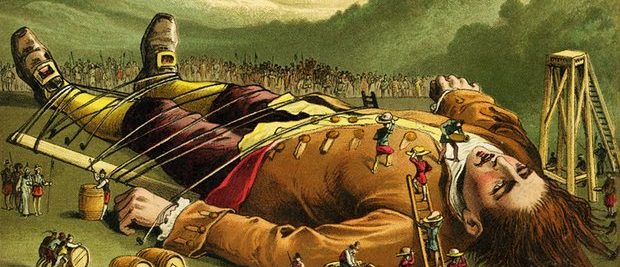Op-ed: Gulliver’s Travels and Common Core
This op-ed appeared in The Daily Caller and The New Bedford Standard-Times on October 27, 2016.
by Jamie Gass
“It is universally read, from the cabinet council to the nursery,” British dramatist John Gay wrote about Jonathan Swift’s 1726 satirical masterpiece, Gulliver’s Travels. October marks the 290th anniversary of Lemuel Gulliver’s towering stride onto the world’s literary scene.
From parents and teachers to Hollywood cartoonists, everyone knows kids love Swift’s witty classic about the shortcomings of human nature. For nearly 300 years, his fantastical fiction has shocked and amused adults and schoolchildren alike.
Due to monumental leadership from 1993 Massachusetts Education Reform Act (MERA) co-authors Tom Birmingham, Mark Roosevelt, and Bill Weld, and the state’s English teachers, literature was central to the Bay State’s nation-leading English standards and tests.
As a result, from 2005 to 2013, Massachusetts students outperformed their counterparts from every other state on the reading portion of the National Assessment of Educational Progress (NAEP), known as “the nation’s report card.”
The commonwealth’s sterling record is a tribute to the higher-level vocabulary and engaging narratives in timeless novels. Jonathan Swift’s playful creativity and unique language dwarfs the “informational texts” found in nationalized K-12 standards known as Common Core.
But Gov. Deval Patrick’s administration traded away Massachusetts’ proven, literature-rich English standards for $250 million in one-time federal grant money. With that money came Common Core, which cut the classic fiction Bay State students read by 60 percent.
“For much of the 20th century, British literature held the center of high school English courses…,” warned scholars Mark Bauerlein and Sandra Stotsky in 2012. “We find no explanation for Common Core dispensing with it.”
By 2015, the commonwealth fell to a second-place tie nationally on the eighth-grade NAEP reading test, and average SAT scores were down 20 points, especially on the writing portion. Massachusetts, welcome to the small-minded world of Common Core.
During Gulliver’s voyages, he finds himself giant in Lilliput, tiny in Brobdingnag, surrounded by aloof scientists on the flying island of Laputa, and considered a beast by philosopher-king horses in the Country of the Houyhnhnms.
From his imaginative characters and wordplay, the Oxford English Dictionary includes 150 Swiftian entries, words like Yahoos (human brutes) and Lilliputians (petty, greedy people).
In addition to his literary writings, Swift joined 18th century English poet Alexander Pope and politician Henry St. John Bolingbroke in writing political pamphlets skewering Great Britain’s corrupt court politics, banking system, and imperial aspirations. Their political essays exercised tremendous influence on America’s revolutionary and founding generations.
John Adams, who drove American independence and drafted Massachusetts’ 1780 Constitution, wrote of Swift’s works, “[T]here are not to be found in any library so many accurate ideas of government, expressed with so much perspicuity, brevity, and precision.”
An Irishman, Swift painted an unflattering portrait of Great Britain with his humorous depiction of Lilliput, which mirrored the empire Americans rejected in 1776. Life in its capital city Mildendo is dominated by vain and acquisitive little people who rise in politics via games of leaping, creeping, and stooping before the emperor.
Led by our capital’s Lilliputians and Yahoos — the Council of Chief State School Officers, the National Governors Association, and Achieve, Inc. — Common Core excludes Gulliver’s Travels and the world’s great satires from its list of so-called “exemplar texts.”
The Lilliputians finally indict man-mountain Gulliver for extinguishing a fire in the royal palace by “making water” on their tiny kingdom and haughty little empress. Well-crafted satire like this teaches students to laugh at the folly of human pride.
The public evidently agrees. Common Core’s support has plummeted in recent national polls, prompting the Democratic National Committee to write, “[The Common Core is] a political third rail that we should not be touching at all.” Hillary Clinton called it a “political failure.”
Ultimately, Governors Patrick and Charlie Baker benefited from being English majors at Harvard College; they then sent their kids to elite private schools, or pre-Common Core public ones.
But in contrast to the giants of the 1993 MERA era, the Patrick-Baker administrations have enjoyed outsized popularity, while offering Massachusetts puny leadership on K-12 academic quality.
“A hypocrite reversed” is how a biographer described the mischievous integrity of Jonathan Swift’s comic genius. Let’s hope future political leaders will read classic literature and free our schoolchildren from the absurd world of Common Core’s Lilliputians.
Jamie Gass directs the Center for School Reform at Pioneer Institute, a Boston-based think tank.



